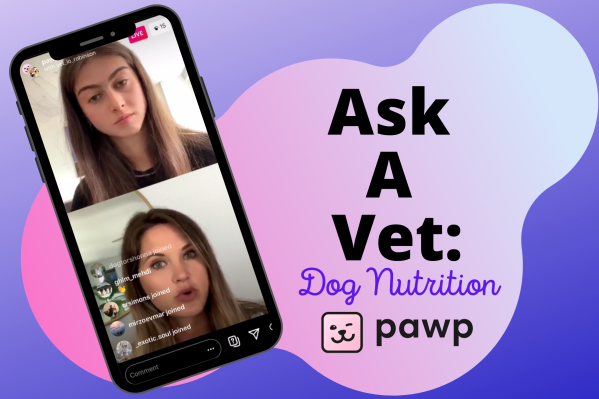In our Ask A Vet series, Pawp interviews Dr. Laura Robinson on Instagram Live about puppy food, dog nutrition, and more. The questions we asked came from the Facebook group Pets Health In Quarantine. If you’d like a vet to answer your questions, join the group and post. This interview has been transcribed and edited for length and clarity.
What Should You Feed A Puppy?
There's no "for sure this diet. For sure that diet." There's a lot of different ways you can go about feeding your puppy. But the most important thing that I tell people is just make sure it's a puppy specific diet. They have different nutrient profiles and such, so you want to make sure that you're feeding a puppy food that's formulated for puppies specifically.
What's The Difference Between Puppy Food And Adult Dog Food?
They just have a more specific and precise balance of different minerals and vitamins to make sure they're growing correctly and that they're getting all the correct nutrients. So for instance, they usually have a little bit more protein, a little bit more fat. They also have different amino acid profiles and such, different balances of calcium and phosphorus. These help make sure their bones are growing correctly, but not too quickly — and it gives them a lot of calories, more calories. It's more calorie dense than regular food, to make sure they're growing appropriately and to give them a long, healthy life.
Is Dry Food Or Wet Food Better For Dogs?
It doesn't really matter too much. There are pros and cons of both. If you want to do both, you can. If you want to just do one or the other, you can. Dry food is a little bit easier, less messy. So you totally can just do dry kibble. With my own dog I just do dry. It helps a little bit more with their teeth too. Just the chewing action and stuff kind of rubs the teeth as they're eating so it helps keep their teeth a little bit nicer longer versus wet food can kind of get stuck in there and make tartar build up a little bit quicker.
That said, it does provide them with more water content if you're feeding canned food, which is sometimes important. If they have things like kidney disease or if they already have bad teeth and you know that they need dental care already. Their teeth are loose or there's tons of tartar, they might not be able to chew dry kibble. So you might have to do wet in that case to make it a little easier for them to chew. So kind of case by case, but you can do either one.
How Can You Treat Tartar Buildup From Dog Food?
If your dog will let you brush their teeth, that's the biggest thing that's going to help, if you're able to do that even every day would be amazing. But at least a couple of times a week, and it's really just the bristle action from the toothbrush itself. Make sure you're getting a dog toothpaste, don't use human (it's toxic!). Dental treats are also great. Greenies are great.
Try to get them used to a brush as early on as you can, get used to that feeling when they're puppies, even if they don't need tons of dental care at that point. But getting them used to that early and just trying to brush their teeth as often as possible. There's also enzymes and things you can add to their water to help break down the plaque too. And then usually a couple of times in their life, you're going to have to go into your vet for an anesthetized cleaning where they polish and do everything that you do when you go to your dentist.
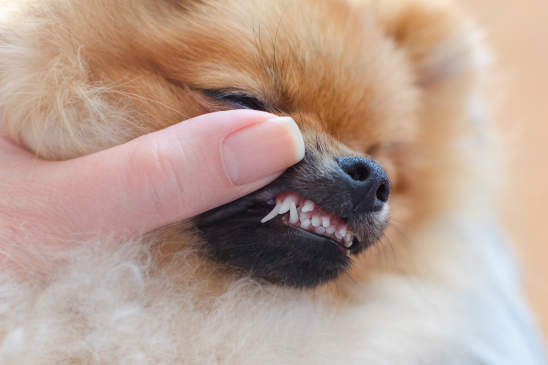
When Is The Right Time To Switch From Puppy To Adult Dog Food?
I think in general a good rule of thumb is around 8 to 10 months, if they're a smaller breed dog. That's usually when they're mature and they're considered an adult. If you have a larger breed dog, I usually say try to hold off until they're 1. Sometimes even if they're like a Great Dane a little bit longer than that. But yeah, I would say, I mean even 1 is fine, but sometime between like 8 months to a year.
What Dry Dog Food Options Are There?
There's so many different varieties and it's hard for me even to keep track these days, just because people have started worrying about their dog's nutrition way more than they ever have I think. And it's just a sign of the times are people are caring a lot more about what goes into their dog food than we used to. There's just used to be kind of a couple brands on the shelf and that was your options. Now there's so many more, which is great.
So the coated kibble is kind of like Stella & Chewy's. They bake their food minimally and then they coat the top with the raw meat. So it's coated in raw meat basically, but it is cooked a little bit.
And then the baked kibble, that's a little bit different than your regular kibble that you buy. The baked is minimally processed so it takes hours to cook it, but they try to use a lower temperature and it's heated only once for a shorter period of time at moderate temperatures versus regular kibble, which is baked for a lot longer, goes through a lot more processing and higher temperatures and such.
And then there's freeze dried food. There's a dehydration process where they freeze it and then have the secondary drying phase and then freeze dry it again. So it just takes out all of the water content basically from the food and then you can keep it in your freezer or anything like that and then take it out and use it for your dog.
Which Diet Is Healthiest For A Dog? Which Diet Would You Avoid?
I don't really like raw diets very much. I have seen some dogs do well on it, but I think there's just so many variables and things that can go wrong with it that I think most of the time it does more harm than good. So I'm just a fan of the regular. Fresh food, that's also an option, fresh cooked food. If you want to do something more fresh, that's totally fine.
Also prices matter a lot. You're going to pay a lot more to have fresh cooked food for your dog so not everyone can do that. There are great kibble options out there, so really whatever you want to do. Just you can find a good one to do that. I feed my own dog just regular kibble, but yeah, it's whatever you want to do. Fresh food is fine as well. I'm just kind of anti raw.
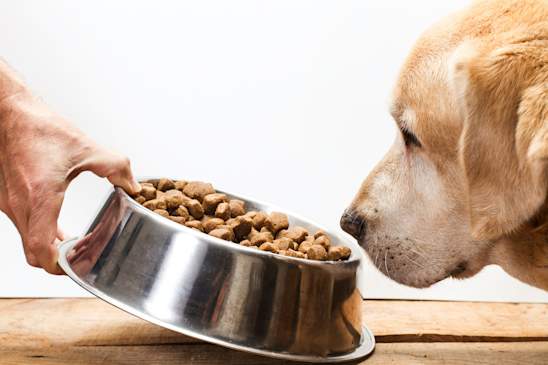
Can You Make Your Own Dog Food?
Definitely! When you're making your food, I would look up foods that are toxic to dogs. But just a couple ones that you would want to be careful are things like coconut, coconut oil, avocado, citrus stuff.
There are a lot of things that are toxic to dogs that people don't know about. So just do your research if you're going to make your own food. Avoid onions, chives, grapes, chocolate, obviously. I usually don't like adding milk or anything in there either. Different kind of nuts can be toxic too. So yeah, definitely want to do your research.
What Is The Safest Way To Prepare Food For Your Dog?
I think the best way to do it, to make sure you're cooking it all the way, is to just drop it in boiling water and cook it that way. That way you're not adding any oils or anything extra in there that could be bad for them or make them have diarrhea or something like that. And so I'm a big fan of just boiling it. I think that it works really great.
If anyone wants to make their own food, there's a website called balanceit.com. A UC Davis veterinary nutritionist made that site, and you can go on there and pick your ingredients that you want to use and they help you formulate a diet that's well-rounded and balanced.
Yeah and they have a supplement too. They'll sometimes offer you it to make sure it's including everything. So that's a really cool, even if you'd just like to mess around with it, it's kind of cool to go on there. You pick your carb source, fat source, protein source, and then they give you the whole recipe for it.
How Can You Tell If Your Dog Food Is Nutritious Enough?
There's a subset of the government that kind of the FDA will approve different pet food brands. So they will have a statement on their food, like AAFCO. And that means that they've been basically backed by the FDA to be well-rounded and balanced. So I would look for that stamp on the food that you're buying.
Should You Be Using Meal Toppers For Your Dog Food?
These meal toppers are made to try to give people more variety for their pet. Again, people are all about nutrition nowadays and stuff. So it's just another little thing, kind of like us adding herbs and such, salt and pepper to your food. It's just a new thing that different companies are making to top the food to make it more yummy for your dog. So they're fine to use if you want them, but not necessary. I don't use them solely by themselves. They're not meant for that purpose. They're kind of just meant to add a little bit of flavor and variety to your pet's food.

Can You Mix Wet And Dry Dog Food?
That's totally fine. If you want to mix it up, sometimes you kind of have to, if you're giving your dog medication and such. Sometimes they just pick at their kibble, so if they need to eat for sure, that's a good way. I've done that with my dog a couple of times. I'll add in wet food just because I need her to eat to give her medicine. You don't have to do fully one or the other. It's fine to mix it if you want, or just pick one or the other.
Is Wet Food Or Dry Food Better For Cats?
I typically like wet food more with cats. I tell people to try to do it with cats because cats don't drink as much water as they should for some reason. So they're just more prone to be dehydrated, which is why so many cats develop kidney disease later in life. They think there's a link between that and them just not drinking enough water. So by adding in wet food for your cat, you're basically having them eat their water instead of drinking it. So it gives them that extra moisture. So I tell people if you can, it's a good thing to add for your cat, for sure.
Should You Add Supplements To Your Dog's Food?
So usually if you're going to do your own home cooked diet, you'll probably have to add in some supplements in there just to make it, well-rounded. There's too many little tiny things that you wouldn't think of, especially amino acids and minerals and stuff that you're not going to get ... like us, we eat so much variety that we end up kind of being okay in terms of the nutrients that we eat and getting everything that we need.
Dogs eat the same thing for their whole life. So you're having like a small deficiency in what you're feeding them over time, that's going to lead to different health issues. So it's good if you're making your own food, definitely adding a multivitamin and such in there or if your dog is prone to certain things like skin issues or joint issues. I would definitely recommend adding supplements in for those types of things. I know Pawp has great ones on the website too that I would recommend, especially if you have a big dog, the earlier the better to get them on joint supplements or if your dog has allergies, getting them on skin support meds can help too.
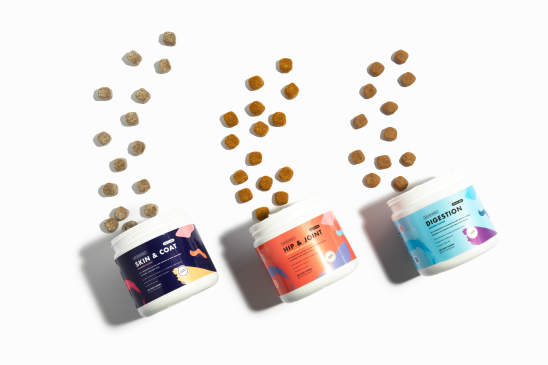
How Much Should Your Dog Eat?
So obviously it's going to vary a little bit depending on how much your dog weighs and stuff. And I was mentioning last week, Ohio State University has a really good website that's called ... if you just type in, I think it's calorie calculator or basic calorie calculator and you can go on there and enter in ... there's kind of different formulas to use and then you times it by a certain number based on if your dog's young, if your dog's old, if you're trying to have them lose weight.
So it's not like a super easy answer to just say here, but I would say that's a great website to go on there. They'll calculate it for you based on how much your dog weighs and how much, if you want them to lose weight, if they're a puppy and that kind of thing. And then it gives you kind of a scaled calories that you should be feeding.
How Accurate Are Feeding Directions On Dog Food?
It can vary, case by case, just because we have so many varieties and breeds these days that that's kind of a general formula for an average dog's metabolism, but it can vary by up to 50%. This is kind of a starting point to go off of if you have no idea, but if you feel like your dog's super hungry and they don't seem to have a weight problem, then you might want to think about feeding them a little bit more, even though that's not exactly what the calculator says. So it's kind of case by case.
If you look at the bag that you're feeding your dog, a lot of times they'll tell you on the side how many calories in one cup. So based on that website you can say, "Okay, my dog needs 1,000 calories a day. That means usually there's like around 300-350 calories in a cup. So my dog needs three cups a day so you kind of got to figure it out based on what you're feeding.
Are Constipation And Diarrhea In Dogs Always Related To Their Diet?
Not always. Not all the time. It can be a sign of another health issue, different endocrine issues or parasites, infections, all of those things can cause changes in bowel movements and glands issues as well. So yeah, but it can be. I mean, I think always when I have a dog come in with any GI issues I definitely ask them what they're eating and make sure they're on a good quality diet, especially puppies. When you change their food to something good if they're on something bad, it can make a big difference in terms of their bowel movements. But so yeah, so it can be, but not all the time.
What Are Signs Your Dog Has GI Issues?
So certain breeds are more prone to GI issues. But I would say if the diarrhea is pretty consistent, more than a day or so. If there's any blood in it. It shouldn't be hard as a rock when they go, but it should be formed stool. And if it's not, then it's worth getting it checked out. Always a good starting point is make sure you're on a good diet and then I always recommend sending out a fecal sample to the lab, make sure they don't have parasites or anything like that. I pretty much always recommend that for new puppies and kittens, but it's good to do once a year too because they just get into stuff sometimes. So yeah, if it goes on for more than a day. If there's blood, if it comes along with lethargy, vomiting, anything like that, then it's time to do some investigating to figure out what you can do to fix that.
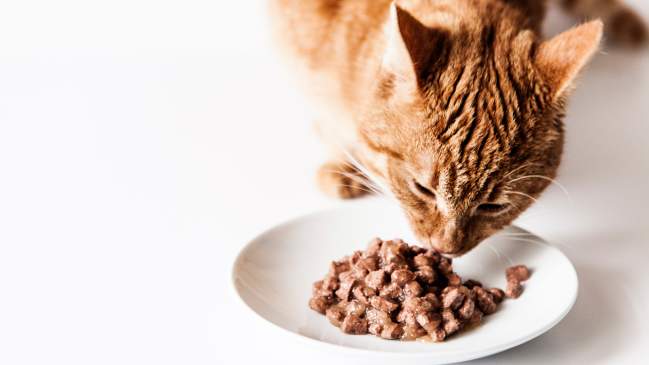
What Else Can Give A Cat Or Dog Stomach Issues?
It could be parasites, could be bacteria, could be viral. Sometimes if they have low thyroid levels or low other hormone levels. Diet. Sometimes if they're having anal gland issues. With cats, they can have megacolon where their colon is just super big and so they can get constipated and kind of backed up that way. So yeah. Could be so many different things. They eat something they shouldn't, got into something, swallowed a little piece of their toy, anything like that.
Can Stress Give A Dog Or Cat GI Issues?
Yeah. Stress too. Like a lot of times if we have dogs... this just happened on Friday actually, I had a pet dog come in for a neuter and so did surgery on him and he was in the hospital all day because he got surgery. But the second he got there, he started having diarrhea and we figured it was from stress from being in the hospital all day. But yeah, they can definitely get stress colitis, it's called. So sometimes if you leave your dog for a weekend to go on a vacation sometimes, they'll get it. So definitely stress can be a big factor too.
